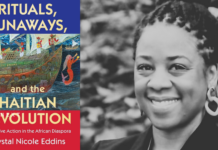Haiti, land of contradictions they say, where the past is not just remembered but lived. The soil still carries the footprints of revolution, the air thick with the echoes of history. And yet, the world sees it in fragments—a place of struggle, a place of need. But Guerline Emmanuel sees something totally different.
Guerline and her husband, Hogarth, stand at the helm of Belle Vue Tours, not as mere entrepreneurs but as witnesses to possibility, believers in what Haiti is, not just what it has survived. Her journey in particular is not about reinventing the wheel but about honoring what is already there.
Three lessons emerge from her story here, each a call to those who would see Haiti as a whole, as three-dimensional:
Partnership is Power. The old ways of competition and undercutting have no place in true transformation. Guerline speaks of collaboration, of lifting together, of recognizing that the very soul of Haiti’s tourism lies in its people on the ground—the artisans, the fishermen, the innkeepers who have always held this nation upright. Belle Vue Tours is not a lone endeavor but an extension of many hands, many powerful dreams.
The Land Remembers. Before she set her course, Guerline and her husband studied the land—not just the terrain but the pulse of the Haitian people, the rhythm of its needs. Haiti’s tourism is not a blank slate but a layered text, one that must be read with care. To build something real, something lasting, she knew she had to listen first.
Skin in the Game The diaspora has long been asked to give—to send, to donate, to patch wounds that never seem to heal. But Guerline asked for something different. She speaks of investment, of shifting from charity to stakeholding, from temporary relief to enduring presence. Lawd help you if you use the dreaded word “resilient” in the same sentence with Haiti. Haiti, she said, does not need another gift; it needs its sons and daughters to plant roots, to claim what is theirs, to believe not just in homecomings but in homebuilding.
This is not just a business story. It is a meditation on legacy, on a nation’s past and the urgency of its future. The question is not whether Haiti can rise—it always has. The question is whether we will see it, whether we will stand beside it, whether we will learn to build with Haiti rather than for it.
Overview: This episode note summarizes the key points raised by Guerline T. Emmanuel, founder of Bellevue Tours, regarding the state of tourism in Haiti, the role of the Haitian diaspora, the challenges of development, and the importance of a common-sense approach to engagement with the country. Emmanuel is presented as a passionate advocate for Haiti, particularly frustrated by the lack of progress and the disconnect between the diaspora’s intentions and the reality on the ground.
Key Themes and Ideas:
1. The Potential and Underdevelopment of Haitian Tourism:
- Huge Untapped Potential: Emmanuel strongly believes Haiti possesses immense potential for a thriving tourism industry. She argues that the country should have hundreds, if not close to 2000, tour companies, bringing millions of visitors and significantly contributing to the GDP (6-10% or more).
- Failure to Capitalize: The current situation with less than 50 tour companies is seen as a failure. Emmanuel emphasizes that in a thriving economy, such a small number would be unacceptable.
- Tourism’s Positive Impact: Beyond direct revenue, tourism supports various sectors like agriculture (local food consumption), transportation (bus companies), and local businesses (hotels, restaurants). She cites examples like the D& Blanc event which utilized many local businesses and injected money into the economy.
- Global Examples: Emmanuel contrasts Haiti’s situation with countries like New York, China, Brazil, and New Orleans, highlighting how heavily these places invest in and benefit from tourism.
- Quote: “For me, we are failing if we have less than a couple hundred tour companies, we are failing. We are a country who need hundreds, if not close 2000 of tour company doing what we are doing.”
- Quote: “Your tour industry, your touristic industry support agriculture. So people will be consuming food in Haiti, so will be buying food in Haiti. You’ll be able to impact the agriculture in Haiti, transportation, the tour companies.”
2. Bellevue Tours’ Business Model and Approach:
- Experience and Research: Bellevue Tours has been operating for 12 years, conducting three years of extensive research before their first tour. This research focused on understanding the existing landscape and identifying partners.
- Partnership Model: Instead of owning assets like buses, Bellevue Tours partners with existing businesses and operators on the ground in Haiti. ViaGen is mentioned as a key partner.
- Focus on Groups: They primarily cater to groups of 10 or more.
- On-the-Ground Due Diligence: A crucial aspect of their process is visiting and vetting every location and service provider before including it in a tour. They conduct site visits to assess logistical challenges and ensure the suitability of locations, even if they are listed in official tourism brochures.
- Investing in Research: Emmanuel highlights their investment in research and legwork to understand the reality of the terrain and service quality, rather than relying solely on remote information.
- Supporting Local Businesses: They prioritize working with Haitian-owned businesses, particularly in rural areas, where hotels and restaurants are often mom-and-pop operations, ensuring money directly impacts the local economy.
- Quote: “Our business model is basically working with others that are on the ground in the industry already, and we partner with them.”
- Quote: “There isn’t a tour that we have done. We don’t go and visit the place first to see if it’s someplace we could bring you. We visit the sites, we do the research, we do the legwork. We invest in the research part, because I can’t find it sitting here.”
3. Critiquing the Diaspora’s Engagement with Haiti:
- Verbal Pride vs. Action: Emmanuel expresses frustration with the Haitian diaspora, suggesting they use Haiti as a source of verbal pride but often lack concrete action or engagement with the country.
- Disconnectedness and Lack of Understanding: A significant issue is the diaspora’s lack of understanding of the reality on the ground in Haiti. Many offer solutions without ever having been to the country or conducting adequate research.
- “American Stamp” and Imposing Ideas: There’s a tendency for the diaspora to want to impose their “American stamp” or ideas based on their experiences abroad, without acknowledging Haiti’s distinct culture, history, and existing structures.
- Taking the Place of Government: The diaspora often attempts to fill the void left by an underperforming government, rather than focusing on how to support and strengthen existing (albeit fragile) government entities.
- Not-for-Profit Basket Case: Emmanuel criticizes the tendency to view Haiti primarily as a “not-for-profit basket case” requiring only aid and donation, arguing that this hinders development.
- Hypocrisy Regarding Rule of Law: A major point of frustration is the perceived hypocrisy of diaspora members who demand rule of law and stability in their adopted countries (like the US) but tolerate or even advocate for chaos and a disregard for legal processes in Haiti.
- “Soft Bigotry of Low Expectation”: This phrase is used to describe the lower standards applied to Haiti compared to other countries, particularly regarding governance and the rule of law.
- Quote: “We use Haiti. As a avenue of pride verbally, and then that’s it. If we are honest with each other, if we wanna be honest with each other.”
- Quote: “I cannot come to Haiti and want to in input my American stamp in Haiti because Haiti, even though I’m outside of Haiti, I’m Haitian. I grew up predominantly here, Haiti. I have a culture, I have a history.”
- Quote: “I have a big problem with, is that we all see Haiti as a, as a not-for-profit basket case area. To assist. No country developed by, not-for-profit only.”
- Quote: “You ask for rule of law here and then you have for chaos at home. That’s a hypocrisy that I cannot deal with.”
4. The Importance of Government and Local Structures:
- Government’s Essential Role: Emmanuel emphasizes that certain functions, such as providing basic protection and establishing a foundation for development, are the inherent role of the government. She argues that individuals and businesses cannot fully compensate for the government’s shortcomings.
- Understanding Existing Structures: Despite perceived fragility, government entities (like local mayors, disaster response units) exist. The diaspora should seek to understand how these structures function and how they can work with them, rather than replacing them.
- Decentralization is Crucial: The over-centralization of power and resources in Port-au-Prince is a major impediment. Emmanuel uses the example of earthquake relief, highlighting the inefficiency of relying on Port-au-Prince when resources and expertise might be closer to the affected areas. Developing and empowering regional centers is essential.
- Moving Beyond Port-au-Prince: Haiti should not be viewed as a monolithic entity. The diaspora needs to understand the different regions and their specific needs and realities.
- Quote: “What is your role as a citizen and what is the role of your government? Because you, what is lacking in your government that they need to show up so that you as the citizen can engage and be successful?”
- Quote: “The perception is that we have a democracy and you have different depart, okay? The reality is you are in the Republic of Haiti where one central department that is the gatekeeper of everything.”
5. Investment vs. Donation:
- Tired of Donating: Emmanuel is weary of the constant emphasis on donation as the primary mode of engagement for the diaspora. She argues that years of donating have not led to improvement, suggesting it’s a failed strategy for meaningful change.
- Need for Investment: She advocates for investment in Haitian businesses and industries, emphasizing the diaspora’s desire for generational wealth and economic participation.
- Quote: “Why are we always donating? Why are we always donating? We have to ask ourselves what’s wrong with other people coming into our country? Investing in our country, but when it come to the Jasper hour, we are giving them the opportunity to donate.”
- Quote: “I am tired of donating. Donating will take us far. We have been donating for years and we have gotten worse. So if we are looking at our return on donating, it’s a failure.”
6. The Role and Navigating of Gatekeepers:
- Purpose of Gatekeepers: Gatekeepers often emerge because of the diaspora’s disconnection from the ground reality. They can facilitate access and navigation.
- Potential Pitfalls: Emmanuel warns that gatekeepers have their own agendas, which may not always align with the investor’s or the country’s best interests.
- Need for Due Diligence: It is crucial for individuals to conduct their own research and due diligence to understand the terrain and the areas they wish to impact, reducing their reliance on gatekeepers.
- Not Always Bad: Gatekeepers aren’t inherently negative, but relying solely on them without independent understanding cedes control and increases vulnerability.
- Refusal to be Told “You Cannot”: Emmanuel firmly rejects the idea that gatekeepers have the right to tell diaspora members they cannot do something in Haiti, especially when foreigners are actively operating there.
- Quote: “Your gatekeepers is because you are disconnected is because you don’t know the lay of the land. You don’t know the country, you don’t know the areas that you want to impact. So your gatekeepers make it easy for you, but you have to understand that everyone have an agenda.”
- Quote: “Gatekeepers are not always a hundred percent bad. But the one thing that I refuse for someone to do for me is to tell me that, oh, I’m able to do something in Haiti because no, what give you that? Right? You don’t have that right.”
7. Civic Responsibility:
- New Focus: Emmanuel mentions her new focus on “civic response,” aiming to find ways to interact with Haiti in a civically responsible manner, applying her knowledge and experience to assist and work with people in Haiti.
Most Important Facts and Ideas:
- Haiti’s tourism potential is vastly underdeveloped.
- The current state of the tourism industry is seen as a failure.
- Tourism has significant ripple effects on other sectors like agriculture and transportation.
- Bellevue Tours’ success is attributed to extensive research, partnership with local businesses, and on-the-ground vetting.
- A key criticism of the diaspora is the disconnect between verbal pride and concrete action/understanding of Haiti’s reality.
- The diaspora often attempts to replace government functions instead of supporting existing structures.
- Viewing Haiti as a “not-for-profit basket case” is detrimental to development.
- There is a perceived hypocrisy in demanding rule of law abroad but accepting chaos in Haiti.
- Decentralization and empowering regional areas outside of Port-au-Prince are essential for development.
- Investment, not just donation, is crucial for sustainable change.
- While gatekeepers can be helpful, individuals need to do their own research and be aware of potential conflicting agendas.
This briefing document summarizes the core arguments and perspectives of Guerline T. Emmanuel as presented in the provided excerpts. Her passionate advocacy for a more informed, engaged, and investment-focused approach from the Haitian diaspora, coupled with a realistic understanding of Haiti’s challenges and existing structures, forms the basis of her message.
A Study Guide: Understanding Haitian Tourism and Diaspora Engagement
Quiz
- What research process did Guerline Emmanuel and her husband undertake before starting Bellevue Tours, and how long did it take?
- How does Bellevue Tours’ business model differ from having their own buses, and who is their biggest partner?
- Besides Bellevue Tours, name at least two other Haitian-focused travel companies mentioned in the interview.
- According to Guerline Emmanuel, what is the ideal number of tour companies Haiti should have to support a thriving tourism industry?
- How does the tourism industry in Haiti potentially support other sectors like agriculture and transportation?
- What is Guerline Emmanuel’s primary frustration regarding how tourism in Haiti is perceived and discussed?
- What does Guerline Emmanuel believe is missing in the discussions and actions of the Haitian diaspora regarding impactful change in Haiti?
- Why does Guerline Emmanuel take issue with the perception of Haiti primarily as a “not-for-profit basket”?
- According to Guerline Emmanuel, what is the key difference between the perception and reality of governance and structure in Haiti?
- What is Guerline Emmanuel’s main concern regarding the role of “gatekeepers” for those in the diaspora looking to invest or engage in Haiti?
Answer Key
- They conducted three years of research to understand the situation on the ground before doing their first tour.
- Their model is to partner with others already in the industry. Their biggest partner is ViaGen.
- My Haiti Travel, Haitian Nomads, Safe Trip Haiti, and Culture Travel are mentioned. (Any two are acceptable).
- She believes Haiti should have hundreds, if not close to a thousand, tour companies.
- Tourists consume food, supporting agriculture, and tour companies utilize transportation services like bus companies, injecting money into that sector.
- Her frustration stems from the lack of understanding and appreciation for the immense possibilities of tourism in Haiti and the failure to prioritize its development.
- She believes the diaspora often lacks a reality-based understanding of Haiti, attempting to impose external ideas without knowing the local context or working with existing structures.
- She feels Haiti is often viewed solely as a place for charitable assistance, when she believes development should also be driven by investment and business.
- The perception is a democracy with different departments, but the reality is often a “Republic of Port-au-Prince,” with a centralized structure controlling everything.
- She is concerned that gatekeepers might exploit those who are disconnected from the reality on the ground in Haiti and might not always align their agenda with the investor’s or the country’s best interests.
Essay Format Questions
- Analyze Guerline Emmanuel’s perspective on the Haitian diaspora’s engagement with Haiti. What criticisms does she level, and what solutions or alternative approaches does she suggest?
- Discuss the importance of understanding the “reality on the ground” in Haiti, as highlighted by Guerline Emmanuel, for both tourism development and diaspora involvement. How does this understanding differ from perceptions formed from abroad?
- Explore the tension between “donating” and “investing” in Haiti, as presented in the interview. What are the potential benefits and drawbacks of each approach, according to Guerline Emmanuel?
- Examine the role of government and existing local structures in Haiti, based on Guerline Emmanuel’s remarks. How does she believe the diaspora should interact with these entities, and what are the consequences of bypassing them?
- Discuss the significance of local knowledge and partnerships in the Haitian tourism industry, using Bellevue Tours’ approach as an example. How does working with Haitian-owned businesses contribute to the local economy and a more authentic experience?
Glossary of Key Terms
Civic Responsibility: The duties and obligations of a citizen to their community and country. Mentioned by Guerline Emmanuel as a new area of focus for her engagement with Haiti.
BV Tours (Bellevue Tours): A tour company founded by Guerline T Emmanuel and her husband, focused on organizing tours in Haiti.
Clubhouse: A social audio app mentioned as the platform where the interviewer and interviewee connected.
ViaGen: A partnering company that works with Bellevue Tours, described as an English woman (Jacqueline Lebaum) who has been in Haiti for over 30 years and works with transportation.
D and Blanc: An event mentioned where Bellevue Tours served as the touristic company, highlighting the large-scale transportation needs for such events.
GDP (Gross Domestic Product): A measure of the total value of goods and services produced in a country, mentioned in the context of tourism’s potential contribution to Haiti’s economy.
Diaspora: People who have spread or been dispersed from their homeland. In this context, it refers to Haitians living outside of Haiti.
Brain Drain: The emigration of highly trained or intelligent people from a particular country. Mentioned in the context of skilled Haitians leaving the country.
Republic of Port-au-Prince: A phrase used to describe the centralization of power and resources in the capital city of Port-au-Prince, suggesting that other regions of Haiti are often overlooked.
Gatekeepers: Individuals or entities who control access to information, resources, or opportunities. In the context of the interview, it refers to people the diaspora might rely on to navigate or invest in Haiti, with potential concerns about their motives.



